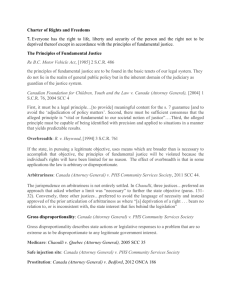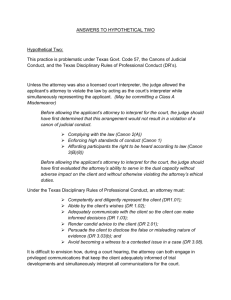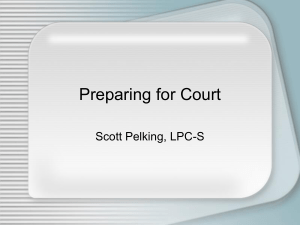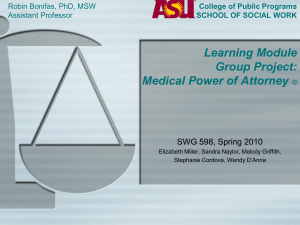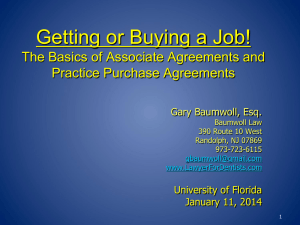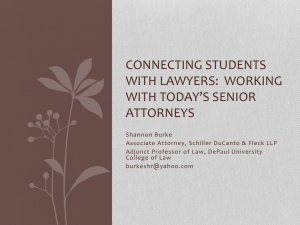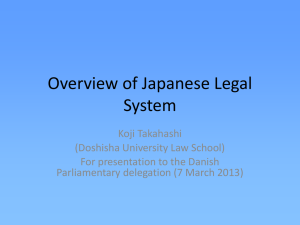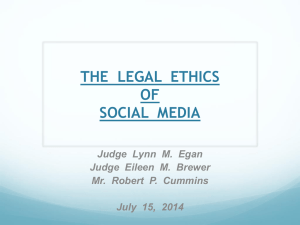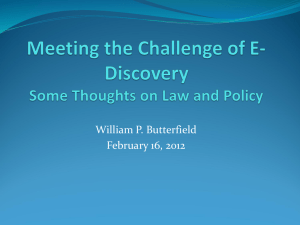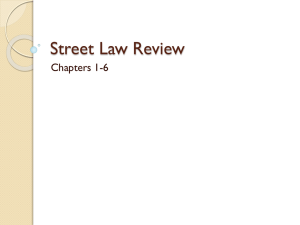Orientation - Washington University School of Law
advertisement
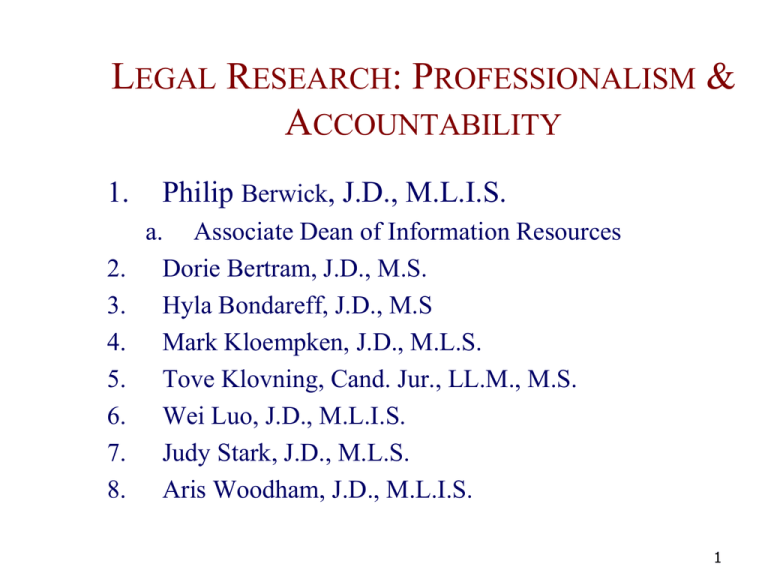
LEGAL RESEARCH: PROFESSIONALISM & ACCOUNTABILITY 1. 2. 3. 4. 5. 6. 7. 8. Philip Berwick, J.D., M.L.I.S. a. Associate Dean of Information Resources Dorie Bertram, J.D., M.S. Hyla Bondareff, J.D., M.S Mark Kloempken, J.D., M.L.S. Tove Klovning, Cand. Jur., LL.M., M.S. Wei Luo, J.D., M.L.I.S. Judy Stark, J.D., M.L.S. Aris Woodham, J.D., M.L.I.S. 1 HOW IS THIS CLASS DIFFERENT 1. 2. This is not a doctrinal class. In your other classes you are learning about the law and how to think like a lawyer. This is a skills course; it is about teaching you to use the tools of your profession. 2 WHY IS LEGAL RESEARCH DIFFERENT? 1. Legal Research is about finding recognized legal authority a. This type of research is different than looking up something as an undergrad or graduate student or on a job where you are not a licensed professional. b. This course is preparing you to use the tools of your profession so that you find legal authority that is current and accurate. c. That you can take before a judge so that the judge will rule in your favor. d. That you can use in giving a client advice so that they act in accordance with the law and so that any actions that they take can stand up in court or an administrative proceeding. 3 ACCOUNTABILITY 1. A professional attorney can be disciplined or sanctioned for a failure to research a legal issue. a. By your licensing authority – the state Bar b. By the courts c. By your clients 4 MCCRATE REPORT 5 IN RE FISCHER, A/K/A, THE ATTORNEY WHO DID TOO LITTLE 1. Newly barred attorney was suspended for 60 days for signing nine documents from his client without “. . .any independent assessment of their legal sufficiency.” 2. Board of Attorneys Professional Responsibility found: a. the attorney had filed complex complaints and briefs without performing any legal research into the case, AND, b. did not perform any research into these matters until 5 months after the Board began its investigation into his activities. 6 LEWELLEN, OR, THE OBLIGATION TO KNOW CASE LAW 1. 2. Attorney did not file a motion for a new trial in a timely fashion. He claimed that statutes and case law “laid a trap for an attorney” in regards to the time at which a motion for a new criminal trial could be filed. The court held that “…case law is controlling precedent. Under the doctrine of stare decisis, we are bound to follow prior case law. An attorney is expected to know the law. An attorney may not be at fault where the case law has not settled a point. However. . .the law on this point was settled.” 7 MARCIA, MARCIA, MARCIA 1. 2. 3. Cite checkers are tools used to make sure that the law you wish to rely on is still current. They can also be used to research the issues at hand. Can you say ‘Sanctions.’ 8 BROWN: SAVE MONEY, READ STATUTES! 1. 2. Brown was terminated after informing her employer, Nutrition Management, that she was pregnant and wanted to take leave. She filed suit claiming her employer interfered with her rights to take leave per the Family Medical Leave Act. a. Under the FMLA statute, an employee is eligible for leave if she has been employed for 12 months and for at least 1,250 hours of service during the previous 12-month period. 29 U.S.C. § 2611(2)(A)(ii). Scott Murray, an attorney with general knowledge about employment law and Nutrition Management's director of human resources, said Brown’s termination was “okay.” a. Nutrition Management presented no evidence that it had researched or had an attorney research the requirements of FMLA. Since Nutrition Management made no legal inquiry into the requirements of FMLA, it had “…no reasonable ground to believe Brown’s termination was not a violation of FMLA.” b. Brown was awarded damages in the amount of… 9 BROWN: SAVE MONEY, READ STATUTES! 1. $161,311 in back pay and liquidated damages ($74,000 (back pay) + 6,600 (interest) x 2 (multiplier by which liquidated damages are to be determined under FMLA)). Additionally, her attorney was awarded $145,000 in fees. Thus, Nutrition Management Services lost a total of $306,200 to Brown. This sum total does not include time lost or Nutrition Management’s fees. 10 IN RE S.C., THE PERFECT STORM 1. 2. 3. There are sever consequences for failure to adequately research an issue. This is an appeal run amok. Not only does the appeal lack merit, the opening brief is a textbook example of what an appellate brief should not be. . . .To demonstrate error, appellant must present meaningful legal analysis supported by citations to authority and citations to facts in the record that support the claim of error. When a point is asserted without argument and authority for the proposition, “it is deemed to be without foundation and requires no discussion by the reviewing court (…failure of appellant to advance any pertinent or intelligible legal argument ... constitute[s] an abandonment of the [claim of error”].) Hence, conclusory claims of error will fail. 11 IN RE S.C., THE PERFECT STORM 1. 2. Equally unhelpful to us is the string of case citations that contains no references to the volumes of the Official California Appellate Reports where the cases can be found, and no jump cites to the pages of those cases where pertinent holdings purportedly exist. Counsel should never misrepresent the holding of an appellate decision. Not only would that be a violation of counsel's duty to the court, it will backfire because the court will discover the misrepresentation, particularly when it relates to a decision issued by that court. 12 IN RE S.C., THE PERFECT STORM 1. Julie Lynn Wolff has since been disbarred by the state of California. Wolff did not complete terms of a previous suspension by the Bar for failure to notify300 indigent clients of her withdrawal from their cases as well as various other infractions. More information about her record can be found at the State Bar of California homepage. 13 PROFESSIONALISM 1. A professional attorney is expected to be a competent legal researcher. a. b. c. 2. By the courts By your licensing authority – the state Bar By your clients Part of being a legal professional is being a competent legal researcher. 14 WHITE PAPER: RESEARCH SKILLS FOR LAWYERS AND LAW STUDENTS 1. West asked law firm librarians to rate the skills and proficiencies of new associates. a. 2. 3. 4. 5. 6. 7. 8. 9. 10. 11. 12. The librarians surveyed came up with a list of research capabilities that the “Ideal Associate” would possess when they enter a law firm: Conduct efficient, multimedia legal research. Conduct cost-effective legal research. Understand practice-specific…resources. Use a variety of resources, both print and online. Know the value of secondary sources Understand…finding tools (e.g., indices and tables of contents). Understand when to dig deeper. Know how to formulate a research plan. Understand what law firms expect of new associates Know when to stop and ask for help. Have solid legal research and writing skills. 15 TOP 10 THINGS LAW LIBRARIANS WANT YOU TO KNOW 1. 2. 3. 4. 5. 6. 7. 8. 9. 10. Know the basics. Civics 101. Know that you should never, ever start your research with [primary sources on] Lexis and Westlaw if you are clueless about the topic at hand. Know that cite checkers such as Shepard's or Key Cite are much more than case validators. Know that efficiency in searching Lexis and Westlaw is essential. Know that Natural Language searching has not really arrived. Know that everything does not have to come from the Internet. Know when to stop when performing Web-based research, free or fee. Know the limitations of both Web-based research services and print resources. Know that asking the partner or senior associate for clarification is OK. Know that asking your firm law librarians for help is encouraged and expected. 16 IT IS ABOUT JOBS 1. 2. Research (and Writing) skills are skills that employers look for. This is all about JOBS. We have an excellent program, regularly get feedback from students returning from their first summer jobs a. b. c. About how well prepared they are. About how they got the plum assignment because they knew how to research. About how we covered topics other students did not (e.g., legislative history and loose-leaf services) 17 FIRST CLASS 1. Section A2 (Kloempken) a. b. 2. Friday, August 28, 9:00 AM – 10:00 AM Room 204 Section A1 (Kloempken) a. b. Friday, August 28, 10:00 AM - 11:00 AM Room 204 18 FIRST ASSIGNMENT 1. For the first class, do the first three sections of the Legal Research Methodology exercise: Introduction, Brainstorming and Developing a Search Query available from CALI. What you need to know for this exercise 2. a. b. c. d. e. On a disk to be distributed during orientation. Also available on the web. Click to follow the link CALI, http://www2.cali.org/. You will have to register. At the right hand side of the page you will see: Not a registered user yet, click here. Fill out the form, the law school authorization code for Washington University Law School is: WAUNIVstu230. You must read and accept the license agreement. Click on lessons, top tool bar. Click on Legal writing and research. Scroll down to Legal Research Methodology. You must select the version of you want, Windows or Web. If you select Windows, you must download the various installation programs. 19 Nothing gets turned in.

